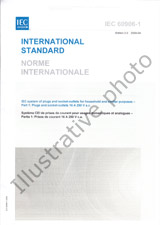We need your consent to use the individual data so that you can see information about your interests, among other things. Click "OK" to give your consent.

IEC/TS 62804-1-1-ed.1.0
Photovoltaic (PV) modules - Test methods for the detection of potential-induced degradation - Part 1-1: Crystalline silicon - Delamination
Translate name
STANDARD published on 10.1.2020
The information about the standard:
Designation standards: IEC/TS 62804-1-1-ed.1.0
Publication date standards: 10.1.2020
SKU: NS-980807
The number of pages: 16
Approximate weight : 48 g (0.11 lbs)
Country: International technical standard
Category: Technical standards IEC
The category - similar standards:
Annotation of standard text IEC/TS 62804-1-1-ed.1.0 :
IEC 62804-1-1:2020 defines procedures to test and evaluate for potential-induced degradation-delamination (PID-d) mode in the laminate of crystalline silicon PV modules-principally those with one or two glass faces. This document evaluates delamination attributable to current transfer between ground and the module cell circuit. Elements driving the delamination that this test is designed to actuate include reduced adhesion associated with damp heat exposure, sodium accumulation at interfaces, and cathodic gas evolution in the cell circuit, metallization, and other components within the PV module activated by the voltage potential. The change in power of crystalline silicon PV modules associated with the stress factors applied (the purview of IEC TS 62804-1) is not considered in the scope.
We recommend:
Updating of laws
Do you want to be sure about the validity of used regulations?
We offer you a solution so that you could use valid and updated legislative regulations.
Would you like to get more information? Look at this page.



 Cookies
Cookies
